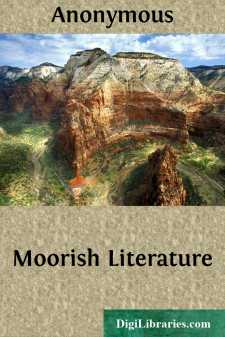Categories
- Antiques & Collectibles 13
- Architecture 36
- Art 48
- Bibles 22
- Biography & Autobiography 813
- Body, Mind & Spirit 142
- Business & Economics 28
- Children's Books 17
- Children's Fiction 14
- Computers 4
- Cooking 94
- Crafts & Hobbies 4
- Drama 346
- Education 46
- Family & Relationships 57
- Fiction 11829
- Games 19
- Gardening 17
- Health & Fitness 34
- History 1377
- House & Home 1
- Humor 147
- Juvenile Fiction 1873
- Juvenile Nonfiction 202
- Language Arts & Disciplines 88
- Law 16
- Literary Collections 686
- Literary Criticism 179
- Mathematics 13
- Medical 41
- Music 40
- Nature 179
- Non-Classifiable 1768
- Performing Arts 7
- Periodicals 1453
- Philosophy 64
- Photography 2
- Poetry 896
- Political Science 203
- Psychology 42
- Reference 154
- Religion 513
- Science 126
- Self-Help 84
- Social Science 81
- Sports & Recreation 34
- Study Aids 3
- Technology & Engineering 59
- Transportation 23
- Travel 463
- True Crime 29
Moorish Literature
by: Anonymous
Description:
Excerpt
SPECIAL INTRODUCTION.
The region which extends from the frontiers of Egypt to the Atlantic Ocean, and from the Mediterranean to the Niger, was in ancient times inhabited by a people to whom we give the general name of Berbers, but whom the ancients, particularly those of the Eastern portion, knew under the name of Moors. "They were called Maurisi by the Greeks," said Strabo, "in the first century A.D., and Mauri by the Romans. They are of Lybian origin, and form a powerful and rich nation."[1] This name of Moors is applied not only to the descendants of the ancient Lybians and Numidians, who live in the nomad state or in settled abodes, but also to the descendants of the Arabs who, in the eighth century A.D., brought with them Islamism, imposed by the sabre of Ogbah and his successors. Even further was it carried, into Spain, when Berbers and Arabs, reunited under the standard of Moussa and Tarik, added this country to the empire of the Khalifa. In the fifteenth century the Portuguese, in their turn, took the name to the Orient, and gave the name of Moors to the Mussulmans whom they found on the Oriental coast of Africa and in India.
[1] Geographica, t. xviii, ch. 3, Section ii.
The appellation particularizes, as one may see, three peoples entirely different in originвÐâthe Berbers, the Arabs of the west, and the Spanish Mussulmans, widely divided, indeed, by political struggles, but united since the seventh and eighth centuries in their religious law. This distinction must be kept in mind, as it furnishes the necessary divisions for a study of the Moorish literature.
The term Moorish Literature may appear ambitious applied to the monuments of the Berber language which have come down to us, or are gathered daily either from the lips of singers on the mountains of the Jurgura, of the Aures, or of the Atlas of Morocco; under the tents of the Touaregs of the desert or the Moors of Senegal; in the oases of the south of Algeria or in Tunis. But it is useless to search for literary monuments such as have been transmitted to us from Egypt and India, Assyria and Persia, ancient Judea, Greece and Rome; from the Middle Ages; from Celt, Slav, and German; from the Semitic and Ouralo-altaique tongues; the extreme Orient, and the modern literature of the Old and New World.
But the manifestations of thought, in popular form, are no less curious and worthy of study among the Berbers. I do not speak of the treatises on religion which in the Middle Ages and in our day were translated from the Arabic into certain dialects: that borrowed literature, which also exists among the Sonalulis of Eastern Africa and the Haussas and the Peuls of the Soudan, has nothing original. But the popular literatureвÐâthe stories and songsвÐâhas an altogether different importance. It is, above all, the expression of the daily life, whether it relates to fetes or battles or even simple fights. These songs may be satirical or laudatory, to celebrate the victory of one party or deplore the defeat of the True Believers by the Christians, resounding on the lips of children or women, or shouted in political defiance....












